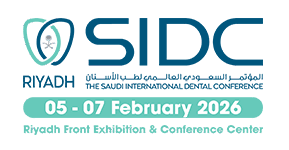Description:
- Submitted abstracts will be evaluated and the top 10 posters (10 for students; 10 for dentists) will be announced as the finalists who will be entitled to present during the conference in front of Judges. Three of which will be the winners: 1st Place, 2nd Place, and 3rd Place.
- Electronic poster or E-Poster is similar to traditional paper poster but displayed on a large LCD television screen. This is not a paper/printed poster. It will be viewed at the E-Poster Stations throughout the conference.
- Each E-Poster must be submitted as a single page PDF document with a size of 3840 pixels (Height) x 2160 pixels (Width) in Vertical/Portrait Orientation.
- Only submitting author will present and get a certificate.
Eligibility:
- Author must be in the dental field, either a Dental Student, Intern, Graduate Student, General Dentist, Dental Specialists, Dental Hygienist, Dental Assistants, or Dental Laboratory Technicians.
- Dental students, interns, and dental auxiliaries can apply for E-Poster presentation Award for Students, while general dentists and dental specialists can apply to E-Poster Presentation Award for Dentists.
Abstract Submission Rules:
- Submitters must be active SDS members from the time of submission until 7 February 2026
- Abstracts must be submitted via the online abstract submission portal only.
- Abstracts must be submitted with the formatting as stipulated in these Guidelines or they will not be accepted. The abstract format must include:
- For EPPA, GDRA, YDRA: Title, Objectives, Methods, Results (data and statistical analysis [where appropriate] and Conclusions.
- For Clinical Case Presentation (CCPA): Title, Introduction, Case description, Discussion, Conclusion/Clinical significance.
- Abstract should be submitted with blinding of authors’ names and institutions.
- Abstracts will be reviewed as submitted by the abstract deadline. No changes to the abstract text, including correcting typographical errors, incorrect data, etc. will be permitted after this date.
- Authors may submit up to 2 abstracts but present only 1 abstract (e.g. 1 abstract as presenting author and other abstract as co-author)
- If the submitter chooses an irrelevant specialty, the Committee will adjust the specialty accordingly. (e.g. Endodontics, Periodontics, etc.)
- If the submitter chooses an irrelevant awards category, the Committee may ask the author to resubmit the abstract to the accurate category.
- Submitting the same abstract by two different authors will cause excluding of both.
- Submitting the same abstract to two different awards will cause excluding of both.
- Agreement form should be signed from other authors, otherwise will not be accepted.
- Abstracts of unfinished research will not be evaluated.
- Previously published abstracts (in print or any electronic format) or those presented at another meeting are not allowed.
- The submitting author must disclose any personal or co-author potential conflict of interest.
- A plagiarized abstract is disqualified.
- The Abstract content must meet the standard of an academic/scientific presentation.
What to expect:
- For abstracts selected as Finalists: PowerPoint presentation (PPT) should be submitted within 2 weeks from the date of the acceptance email. Delay in submission of the presentation may result in cancellation.
- The allotted time of presentation will be 5 minutes for Summary and 2 minutes for Q&A from the judges.
- If no confirmation is received by the deadline, the spot will be given to the next qualifying candidate.
- For any accepted abstract: The poster format previously submitted in JPG/PNG/PDF format will be used for poster display for the duration of the event. Any updated poster should be submitted within 2 weeks from the date of the acceptance email.
Ethical Guidelines:
- Authorship – Submitted cases should be of the clinician’s original work, and properly documented. Student or Resident Authors should have submitted cases approved by the Training Center Director and Case Supervisor/s.
- Ethical Approvals (IRB)– Case Reports should be conducted in full accordance with ethical principles, evidence based guidelines, dental health code and abide with local laws and regulations


